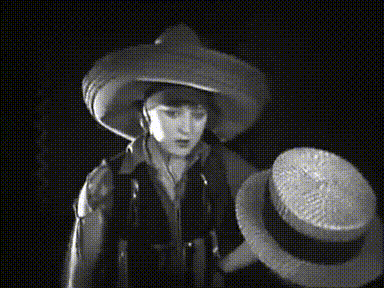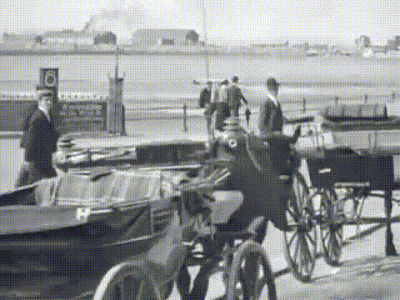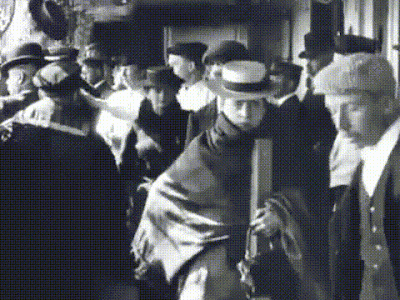Whenever Richard Cory went down town,
We people on the pavement looked at him:
He was a gentleman from sole to crown,
Clean favored, and imperially slim.
And he was always quietly arrayed,
And he was always human when he talked;
But still he fluttered pulses when he said,
"Good-morning," and he glittered when he walked.
And he was rich—yes, richer than a king—
And admirably schooled in every grace:
In fine, we thought that he was everything
To make us wish that we were in his place.
So on we worked, and waited for the light,
And went without the meat, and cursed the bread;
And Richard Cory, one calm summer night,
Went home and put a bullet through his head.
I remember that we "took" this poem in school, way back in Grade 7 or thereabouts, and the chagrin, the consternation of the class: "But why did he DO that?" "He had everything." "Everyone envied him." "It's not fair." "It's a joke, isn't it?" " That would never happen."
My "favorite" was this lovely statement, which I have heard echoed many times and from many people - I mean adults who should know better, not kids:
"You kill yourself because you're crazy, and you're only crazy if you want to be."
I wonder now, if that kid is still alive, whether he thinks the same way.
I'm not supposed to think about any of this, of course. As one writer said, Robin Williams' death caused many people to suddenly come out of the closet and proclaim, "Yes, me too". But where are they now? No doubt they have retreated in terror, hoping against hope that no one remembers their foolishness.
I've written about this before. Halloween is coming, and in the past I've seen "mental patient" costumes, often with restraints and lurid "nurses" with syringes full of "sedatives". It's funny, isn't it? Come on. Come on, don't you have a sense of humour?
No. If that's what humour is, then no.
My brother was in these "loony bins", "nut wards", etc., on and off for years. I loved him dearly, and by his own admission he was not just crazy but "ca-RAZY". Eerily, I used to compare him to Robin Williams in his madcap ability to riff on outrageous themes, putting on characters and taking them off like masks, only to change at light speed to another subject entirely. One time he did a riff on the '60s TV show The Real McCoys, doing every voice from Grandpa to Luke to Little Luke to Hassie to Kate to - his personal favorite - Pepino. Some of it was so x-rated that we fell out of our chairs.
He died in 1980, not of suicide as almost everyone assumes, but an accident. Two months later, John Lennon was shot and killed. It was a point of despair in my life.
So what is it about people who seem to have everything, who do themselves in anyway? I think of Phillip Seymour Hoffman, relapsing most awfully into a habit he thought he had beaten. I think of Amy Winehouse drinking a gallon of vodka and poisoning herself at age 27. I think we think they are immune. Not just that they are rich and famous, but loved - aren't they loved, too, I mean by friends and family?
Are they? Is there - is there balm in Gilead?
I have already published a couple of eerily similar photos of Robin Williams with dear friends who hold him so tenderly, he looks like a baby bird fallen from the nest. I once read that people who don't feel loved are like sawdust dolls with a tiny hole in the bottom. It keeps trickling out, almost imperceptibly, until the person is desperate for more supplies to keep from bleeding out.
It's also from remembering Williams, who seems to have died a very long time ago (but at the same time, only yesterday), but most of all it's because yesterday I bought Billy Crystal's memoir, Still Foolin' 'Em: Where I've Been, Where I'm Going, and Where the Hell Are My Keys? It's typical self-deprecating Crystal humour, but not excoriating, with a sweetness, a gentleness that I have always loved about him. In fact, he is my favorite comedian.
He and Robin Williams were best friends. Closer than brothers, in many ways. This book was written and published before his suicide, but on the back is a quote from Williams that now seems poignant and unsettling: "This book is kick-ass funny and truly unique. A Hollywood autobiography with only one wife, no rehab, a loving family, and loyal friends."
I wonder if Williams secretly feared he had none of those things. It's a bit scary that he focused on that, as if to shame himself for having three wives and multiple trips to rehab. To imply, almost, that Crystal was a superior version of himself - or, at least, not so scarred, not so vulnerable.
I don't want to go much farther into this because I don't fancy triggering off a lousy day of depression. It wouldn't do anything to change the situation. But oh how I wish people would wake up. I thought of a scenario that might have saved him - everyone has a theory, so here goes, here is mine:
He is pacing the floor, both despondent and frantic, knowing there is no way out of the crushing adversity that is coming at him from all sides. Soon he will be paralyzed from Parkinson's, his career will be over, and he won't be able to take part in the cycling that has kept him sane. Rehab did no good at all and made everything worse. He looks back with shame over the battlefield of his life, and for that moment he can't see anything good about it. At all. He has made a mess of things, and there is only one way out.
Though it is agonizing to do, though he has to stand up to an immense shame that is nearly overwhelming, he goes over to the phone, picks up the receiver, dials 9-1-1.
"Hello. I'm going to kill myself. Come get me, please. NOW."
CODA. From Leonard Bernstein's Mass. I used to carry this around written on a little piece of paper. Once a counsellor took it from me and read it in a sing-songy, Betty Crocker voice, then handed it back to me saying, "Oh, that's nice."
I remember that we "took" this poem in school, way back in Grade 7 or thereabouts, and the chagrin, the consternation of the class: "But why did he DO that?" "He had everything." "Everyone envied him." "It's not fair." "It's a joke, isn't it?" " That would never happen."
My "favorite" was this lovely statement, which I have heard echoed many times and from many people - I mean adults who should know better, not kids:
"You kill yourself because you're crazy, and you're only crazy if you want to be."
I wonder now, if that kid is still alive, whether he thinks the same way.
I'm not supposed to think about any of this, of course. As one writer said, Robin Williams' death caused many people to suddenly come out of the closet and proclaim, "Yes, me too". But where are they now? No doubt they have retreated in terror, hoping against hope that no one remembers their foolishness.
I've written about this before. Halloween is coming, and in the past I've seen "mental patient" costumes, often with restraints and lurid "nurses" with syringes full of "sedatives". It's funny, isn't it? Come on. Come on, don't you have a sense of humour?
No. If that's what humour is, then no.
My brother was in these "loony bins", "nut wards", etc., on and off for years. I loved him dearly, and by his own admission he was not just crazy but "ca-RAZY". Eerily, I used to compare him to Robin Williams in his madcap ability to riff on outrageous themes, putting on characters and taking them off like masks, only to change at light speed to another subject entirely. One time he did a riff on the '60s TV show The Real McCoys, doing every voice from Grandpa to Luke to Little Luke to Hassie to Kate to - his personal favorite - Pepino. Some of it was so x-rated that we fell out of our chairs.
He died in 1980, not of suicide as almost everyone assumes, but an accident. Two months later, John Lennon was shot and killed. It was a point of despair in my life.
So what is it about people who seem to have everything, who do themselves in anyway? I think of Phillip Seymour Hoffman, relapsing most awfully into a habit he thought he had beaten. I think of Amy Winehouse drinking a gallon of vodka and poisoning herself at age 27. I think we think they are immune. Not just that they are rich and famous, but loved - aren't they loved, too, I mean by friends and family?
Are they? Is there - is there balm in Gilead?
I have already published a couple of eerily similar photos of Robin Williams with dear friends who hold him so tenderly, he looks like a baby bird fallen from the nest. I once read that people who don't feel loved are like sawdust dolls with a tiny hole in the bottom. It keeps trickling out, almost imperceptibly, until the person is desperate for more supplies to keep from bleeding out.
What got all this started again? Well, it's close to Halloween which makes me think of all those awful mental patient costumes, totally dehumanizing but seen as ghoulishly funny, and CERTAINLY not anything to be offended about. (You're too sensitive, you know? That's your whole problem.) We don't have Parkinson's or MS or ALS Halloween costumes, but then again, these illnesses are "physical", "real", no one's fault, with the sufferers seen as dignified and courageous, and therefore not frightening or subject to mockery. After all, it would be in very poor taste.
It's also from remembering Williams, who seems to have died a very long time ago (but at the same time, only yesterday), but most of all it's because yesterday I bought Billy Crystal's memoir, Still Foolin' 'Em: Where I've Been, Where I'm Going, and Where the Hell Are My Keys? It's typical self-deprecating Crystal humour, but not excoriating, with a sweetness, a gentleness that I have always loved about him. In fact, he is my favorite comedian.
He and Robin Williams were best friends. Closer than brothers, in many ways. This book was written and published before his suicide, but on the back is a quote from Williams that now seems poignant and unsettling: "This book is kick-ass funny and truly unique. A Hollywood autobiography with only one wife, no rehab, a loving family, and loyal friends."
I wonder if Williams secretly feared he had none of those things. It's a bit scary that he focused on that, as if to shame himself for having three wives and multiple trips to rehab. To imply, almost, that Crystal was a superior version of himself - or, at least, not so scarred, not so vulnerable.
I don't want to go much farther into this because I don't fancy triggering off a lousy day of depression. It wouldn't do anything to change the situation. But oh how I wish people would wake up. I thought of a scenario that might have saved him - everyone has a theory, so here goes, here is mine:
He is pacing the floor, both despondent and frantic, knowing there is no way out of the crushing adversity that is coming at him from all sides. Soon he will be paralyzed from Parkinson's, his career will be over, and he won't be able to take part in the cycling that has kept him sane. Rehab did no good at all and made everything worse. He looks back with shame over the battlefield of his life, and for that moment he can't see anything good about it. At all. He has made a mess of things, and there is only one way out.
Though it is agonizing to do, though he has to stand up to an immense shame that is nearly overwhelming, he goes over to the phone, picks up the receiver, dials 9-1-1.
"Hello. I'm going to kill myself. Come get me, please. NOW."
CODA. From Leonard Bernstein's Mass. I used to carry this around written on a little piece of paper. Once a counsellor took it from me and read it in a sing-songy, Betty Crocker voice, then handed it back to me saying, "Oh, that's nice."
I don't know where to start
There are scars I could show
If I opened my heart
But how far, Lord, how far can I go?
I don't know.
What I say I don't feel
What I feel I don't show
What I show isn't real
What is real, Lord
I don't know
No, no, no. . . I don't know.































.jpg)


















